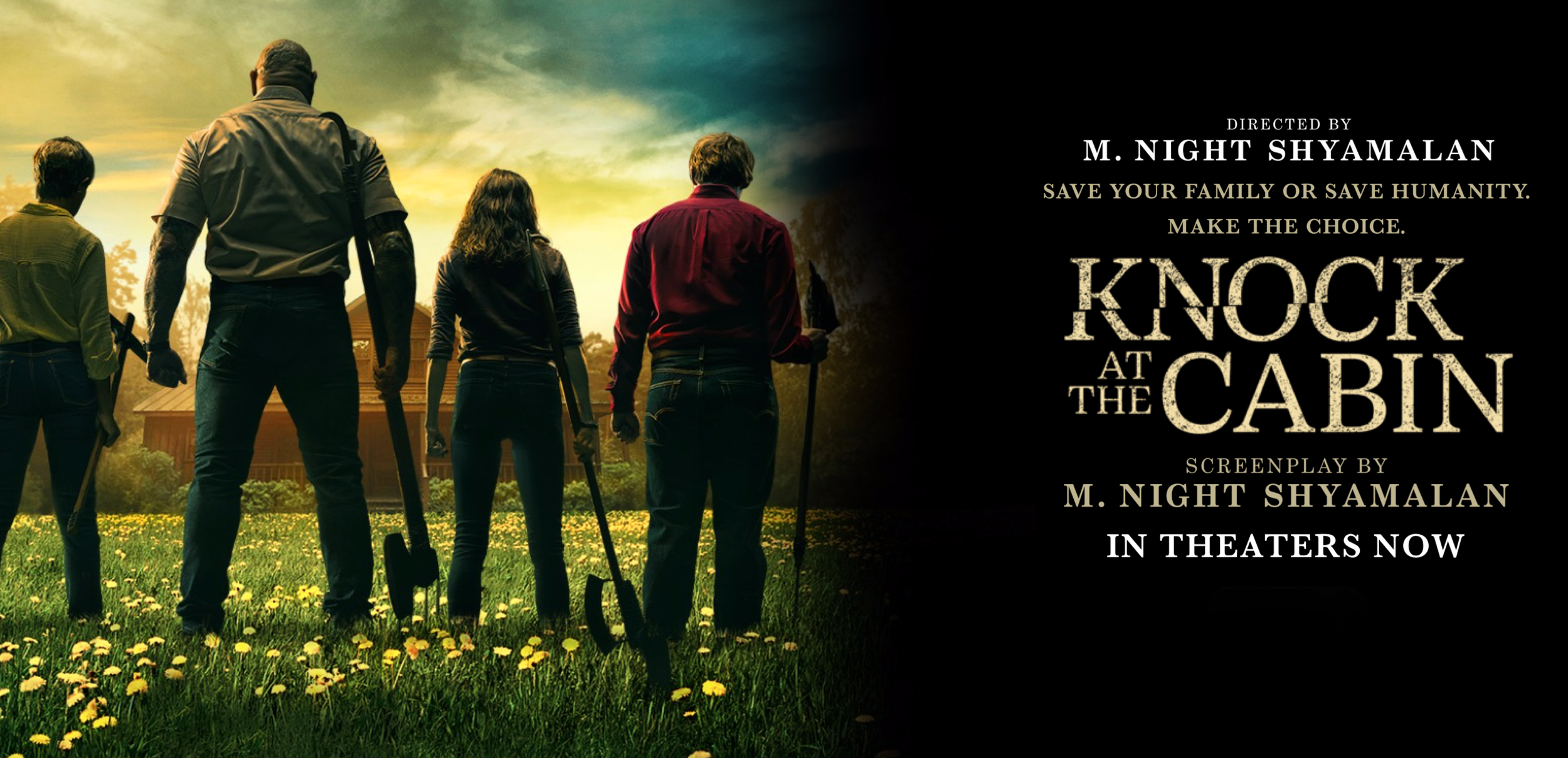In ‘Knock at the Cabin,’ Is The Apocalypse Really the Time to Contemplate Moral Philosophy?
‘Knock at the Cabin’ | Photo from the Website
(REVIEW) ‘Knock at the Cabin,’ a horror, mystery and thriller by director M. Night Shyamalan, arrived at theaters on Friday, Feb. 3.
The cast of ‘Knock at the Cabin’ did not disappoint, starring actors Dave Bautista, Jonathan Groff and Rupert Grint to name a few.
Unsurprisingly, the film takes place in a cabin in the middle of nowhere. But the classic horror movie trope of a home invasion on an unsuspecting family in a cabin in the woods is given a twist.
‘Knock at the Cabin’ addresses a specific question of ethics that a College student might contemplate: the Trolley Problem.
The opening scene of the film introduces the characters Wen (Kristen Cui) and Leonard (Dave Bautista). Seven-year-old Wen is catching crickets in front of the cabin when Leonard approaches her. Despite the warm tone of Leonards's voice, it is immediately obvious that something is dreadfully wrong, and the music, camera angles and unnerving closeness of the shots make this apparent.
Soon after, Wen sees several other figures arriving and her stranger-danger radar finally kicks in. She runs into the cabin to find her dads, Erik (Jonathan Groff) and Andrew (Ben Aldridge).
Wen has a hard time convincing her parents that anything is wrong, but when they hear a knock at the cabin door, they aren’t so confident anymore.
When the strangers are refused entry, they force their way into the cabin and trap the family inside, creating a parallel to the crickets trapped in Wen’s jar. The invaders present Andrew, Erik and Wen with an impossible task: they must willingly sacrifice one of the members of their family, or the apocalypse will begin and all of humanity will die.
The request is ridiculous, and Erik and Andrew refuse to believe that their captors are telling the truth. But the question remains: whose lives do you value more? Your family, or all 7.8 billion humans on earth?
This type of issue is illustrated by the Trolley Problem, a philosophical question that essentially asks whether it is right to save one or many. Throughout the movie, the characters struggle with this ethical problem by playing out several different versions of the question’s answer.
Initially, it seems that the family insists on preserving the few over the many, not willing to sacrifice one of their own to save the rest of humanity. But as the movie wears on and their position begins to falter, it is clear that the choice is not so simple.
‘Knock at the Cabin’ exceeds expectations set by the trailer and is remarkably well-made. However, it is not without its issues. It falls prey to the emotional manipulation cliches of a horror movie through overly dramatic music and dubious character backstories.
Additionally, ‘Knock at the Cabin’ seems to propose interesting ideas yet fails to follow through with them. For example, it is suggested that Erik, Andrew and Wen were not the first family to be given this impossible task. The history behind this mention is not further discussed.
Despite this, the characters, plot and messages of ‘Knock at the Cabin’ are unique and entertaining. The fictional apocalyptic thriller theme mixed with the realistic discrimination issues portrayed in Andrew and Erik's flashbacks create an interesting combination for a horror film.
The movie is currently receiving 68% on rotten tomatoes, which seems like a fair rating in my opinion.
Overall, ‘Knock on the Cabin’ is far better than expected but not necessarily a must-watch. The central question of the movie is one you might prefer to contemplate during office hours with a philosophy professor rather than in a dark theater for an hour and forty minutes.
Joanna Insco is a sophomore from California studying Journalism, Culture and Society at The King’s College. She is an intern at The Brooklyn Paper and is involved in ESTV. She enjoys spending time in nature and drinking copious amounts of coffee.

